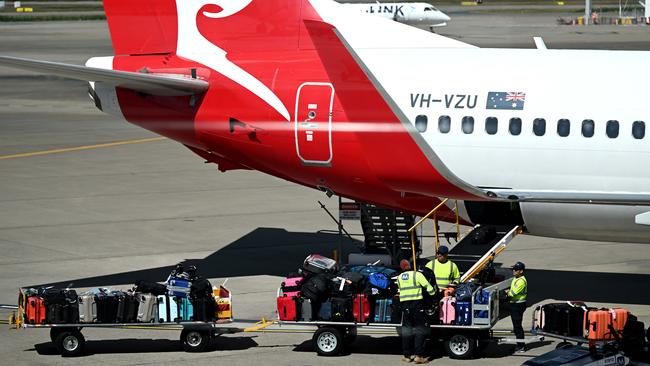Qantas-TWU battle over outsourcing of jobs heads to High Court
The High Court grants Qantas special leave to appeal a decision of the Full Federal Court, which found the outsourcing of more than 1600 workers unlawful.

Qantas has won the latest round of its drawn-out battle with the Transport Workers Union over the legality of the airline’s outsourcing decision made at the height of the Covid pandemic.
In a significant victory, the High Court has granted Qantas special leave to appeal the decision of the Full Federal Court, which found the outsourcing of more than 1600 workers was unlawful.
Hearings are expected to take place in April or May next year, to decide once and for all whether Qantas breached the Fair Work Act by contracting out the jobs of baggage handlers, cleaners and ground crews.
Qantas welcomed the decision while the Transport Workers Union vowed to mount the “strongest possible case” in the High Court, after two Federal Court rulings in the TWU’s favour.
TWU national secretary Michael Kaine said the High Court’s decision to hear the appeal highlighted the magnitude of Qantas’s actions in outsourcing its below the wing workforce.
“While it is deeply disappointing for workers, it’s clear the High Court believes it’s in the public interest to hear such an extraordinary case which has sent shockwaves across the economy and plunged Qantas into chaos,” said Mr Kaine.
“Despite the ongoing crisis at the airline, overpaid executives stand by their illegal actions so vehemently they are dragging out a costly legal battle rather than reinstate or compensate the experienced workers who built the spirit of Australia.”
He said members had faced an “agonising couple of years” but would continue to fight to prove that Qantas acted unlawfully.
“We welcome the opportunity to prove in the High Court how Qantas illegally breached the Fair Work Act,” he said.
The outsourcing decision was made in late-2020 after Qantas grounded much of its fleet and stood down thousands of workers due to the lack of flying.
Although Qantas insisted the outsourcing was motivated solely by commercial reasons — to save $100m a year — the Federal Court was not satisfied beyond reasonable doubt this was the case.
A Qantas spokesman said at the core of the case, was the airline’s ability to legally outsource a function when it was struggling to remain solvent.
“We’ve always expressed our deep regret that our ground handlers, and thousands more across the group, had to lose their jobs as the pandemic hit us,” said the spokesman.
“There was very little certainty about the pandemic and our recovery when we made this decision, and it remained that way for more than a year afterwards. We ultimately lost more than $25 billion in revenue, so it was inevitable that we had to take significant action.”
He said the Federal Court agreed with Qantas’s commercial reasons, but could not rule out that avoiding future industrial action was also a factor in the outsourcing.
“We have always rejected this, which is why are taking our appeal to the High Court,” he said.




To join the conversation, please log in. Don't have an account? Register
Join the conversation, you are commenting as Logout